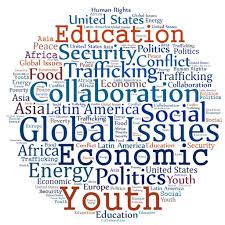```html
Harnessing Indigenous Knowledge for Sustainable Global Development: A Paradigm Shift
Global poverty alleviation and sustainable development necessitate a fundamental shift in perspective. Ignoring the contributions of indigenous communities is not merely shortsighted; it actively hinders progress. Their time-tested knowledge systems, born from generations of intimate environmental understanding, offer innovative, sustainable solutions to humanity's most pressing challenges. This article explores indigenous knowledge's vital role in building a truly equitable and sustainable future, emphasizing international cooperation and respect for indigenous rights.
The Untapped Potential of Indigenous Knowledge Systems
Indigenous communities possess nuanced understandings of their environments, encompassing sustainable agricultural methods prioritizing ecological balance, sophisticated traditional medicine rooted in local flora, and effective conservation strategies that have preserved biodiversity and fragile ecosystems for centuries. Integrating this wealth of experience into mainstream development is not merely beneficial—it's crucial for holistic and effective solutions.
Cultural Preservation and Global Resilience
Recognizing and respecting indigenous knowledge intrinsically involves preserving cultural diversity and heritage. Each indigenous culture represents a unique and irreplaceable contribution to humanity's collective experience. Safeguarding these cultures isn't just about preservation; it's about fostering resilience and enriching our shared human experience, boosting innovation, and creating a more adaptable global community.
Sustainable Agriculture and Enhanced Food Security
Indigenous farming practices often embody principles of long-term sustainability and ecological balance, often surpassing modern industrial agriculture. Adopting these practices—such as crop rotation, intercropping, and agroforestry—moves us toward highly productive, environmentally friendly, and climate-change-resilient agricultural systems, significantly contributing to global food security.
Traditional Medicine and Improved Healthcare Accessibility
Indigenous communities possess deep understanding of medicinal plants and healing practices, often holding knowledge of remedies that modern medicine struggles to address. Integrating this knowledge into modern healthcare can drastically improve effectiveness and accessibility, particularly in underserved areas, while respecting traditional practices.
Biodiversity Conservation and Ecosystem Protection: A Legacy of Success
Indigenous communities have consistently demonstrated remarkable success in conserving biodiversity and protecting fragile ecosystems. Their intimate environmental understanding, combined with traditional resource management, provides invaluable insights into effective conservation. Learning from their methods enables us to develop culturally sensitive and respectful conservation approaches that honor local traditions and land rights.
Climate Change Adaptation and Resilience: Learning from the Past
Indigenous communities possess a long history of adapting to changing climates. Their deep understanding of weather patterns, natural indicators, and sustainable resource management offers critical guidance in addressing climate change challenges. This includes early warning systems and sustainable resource management practices that enhance community resilience to climate-related shocks.
Empowerment, Inclusion, and Social Justice: A Foundation for Sustainability
Recognizing and valuing indigenous knowledge empowers communities, fostering inclusion in decision-making processes directly affecting their lives. Giving indigenous communities a voice in development initiatives promotes social justice, equality, and self-determination—essential components of true sustainability.
Context-Specific Solutions: Tailoring Strategies for Success
Indigenous knowledge frequently provides context-specific solutions to universal problems. Tapping into this localized wisdom allows us to discover innovative approaches to poverty alleviation, environmental conservation, and sustainable development tailored to specific regions and communities.
Collaborative Knowledge Exchange: Building Bridges for Progress
Genuine partnerships between indigenous communities and other stakeholders foster a dynamic exchange of knowledge and expertise. Collaborative efforts cultivate mutual understanding and respect, leading to more effective and inclusive development initiatives benefiting all participants.
Education, Capacity Building, and Intergenerational Knowledge Transfer: Securing the Future
Investing in education and capacity building within indigenous communities is vital for preserving and transmitting their knowledge to future generations. This ensures the continuity of their wisdom, strengthens their resilience, and empowers them to continue contributing to sustainable development.
Upholding Indigenous Rights: A Moral and Practical Imperative
Respecting indigenous rights—including land tenure, cultural autonomy, and self-determination—is non-negotiable for sustainable development. Recognizing these rights fosters a more just and equitable society, ensuring indigenous communities are active participants in shaping their own futures.
Real-World Examples: Demonstrating the Impact
Numerous global examples demonstrate the remarkable impact of incorporating indigenous knowledge into sustainable development. These examples illustrate the practical application of indigenous wisdom and its potential for achieving tangible results in sustainable resource management, climate change adaptation, and community-based conservation.
The Power of Storytelling: Bridging Cultures and Inspiring Action
Indigenous cultures possess rich storytelling traditions, powerful tools for raising awareness and inspiring action on sustainable development. Sharing these stories fosters empathy and understanding, creating a bridge between cultures and promoting a shared commitment to a sustainable future.
Individual Responsibility and Collective Action: A Shared Commitment
Each individual plays a role in promoting global poverty alleviation and sustainable development. By actively learning about indigenous knowledge, supporting indigenous-led initiatives, and advocating for their rights, we contribute to a more just and sustainable world.
A Call to Action: Embracing Collaboration for a Sustainable Future
Let us embrace the opportunity to learn from and collaborate with indigenous communities, recognizing their invaluable contributions to global sustainability. By integrating indigenous knowledge into development strategies, we can build a more equitable, resilient, and sustainable future for all.
```




